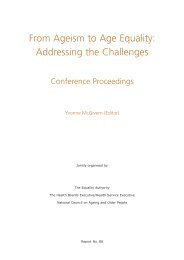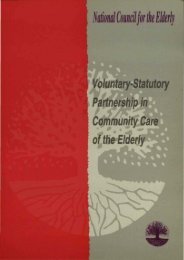Improving Quality of Life for Older People in Long-Stay Care ...
Improving Quality of Life for Older People in Long-Stay Care ...
Improving Quality of Life for Older People in Long-Stay Care ...
- No tags were found...
You also want an ePaper? Increase the reach of your titles
YUMPU automatically turns print PDFs into web optimized ePapers that Google loves.
egional levels. Examples <strong>of</strong> <strong>in</strong>dependent quality <strong>in</strong>itiatives <strong>in</strong>clude the HAIRC,which <strong>in</strong>cludes quality <strong>of</strong> life dimensions, as well as quality <strong>of</strong> care elements.Internationally, many countries have moved to put <strong>in</strong> place mechanisms toguarantee better monitor<strong>in</strong>g and assessment <strong>of</strong> quality <strong>in</strong> long-stay care. TheUK and Australia have established <strong>in</strong>dependent agencies to regulate social andhealthcare services. The USA has developed an RAI and MDS <strong>in</strong> order to identifyand develop quality <strong>in</strong>dicators <strong>for</strong> nurs<strong>in</strong>g home residents, which <strong>in</strong>clude somequality <strong>of</strong> life doma<strong>in</strong>s. However, quality <strong>of</strong> life is still <strong>in</strong> its <strong>in</strong>fancy and rema<strong>in</strong>sunderdeveloped <strong>in</strong> most countries. This is why the policy focus <strong>in</strong> Ireland <strong>in</strong>the com<strong>in</strong>g years must be on quality <strong>of</strong> life as much as on quality <strong>of</strong> care if realimprovements <strong>in</strong> the lives <strong>of</strong> older people <strong>in</strong> long-stay care are to be realised.226The emphasis on quality <strong>of</strong> care at the expense <strong>of</strong> quality <strong>of</strong> life <strong>in</strong> long-stay carehas been due to the fact that quality <strong>of</strong> care has proved easier to measure andassess due to its more tangible nature. Difficulties <strong>in</strong> measur<strong>in</strong>g quality <strong>of</strong> life arisedue to its complex, multidimensional and subjective nature. <strong>Quality</strong> <strong>of</strong> life coversmany doma<strong>in</strong>s and the relevance and importance <strong>of</strong> these doma<strong>in</strong>s rema<strong>in</strong>contentious. Nevertheless, while quality <strong>of</strong> life will depend on people’s <strong>in</strong>dividualcircumstances, personality and life history, there are many th<strong>in</strong>gs that an <strong>in</strong>stitutioncan do to enhance quality <strong>of</strong> life. For this reason, ask<strong>in</strong>g people directly about theirquality <strong>of</strong> life must be built <strong>in</strong>to any new legislation and regulations deal<strong>in</strong>g withquality <strong>in</strong> residential care. It is acknowledged that there are considerable challengesto measur<strong>in</strong>g the quality <strong>of</strong> life <strong>of</strong> older people <strong>in</strong> long-stay care, particularly <strong>for</strong>residents suffer<strong>in</strong>g from dementia. Cognitive and/or communication impairmentsmean that dementia sufferers may f<strong>in</strong>d it more difficult to report on their quality <strong>of</strong>life. Yet, if dementia sufferers are not consulted about quality <strong>of</strong> life, this leaves outa considerable proportion <strong>of</strong> long-stay residents. Measur<strong>in</strong>g quality <strong>of</strong> life <strong>in</strong> dementiapatients is not impossible and a number <strong>of</strong> researchers have successfully identifiedperson-centred quality <strong>of</strong> life doma<strong>in</strong>s <strong>for</strong> residents suffer<strong>in</strong>g from dementia.Any new legislation must acknowledge that residential care is the permanent home<strong>of</strong> the majority <strong>of</strong> its residents. There<strong>for</strong>e, long-stay facilities must be encouragedthrough regulation and sanctions to produce a more home-like environment andreduce the <strong>in</strong>stitutional feel <strong>of</strong> facilities. Residents must be able to cont<strong>in</strong>ueliv<strong>in</strong>g as they did <strong>in</strong> their <strong>for</strong>mer homes, tak<strong>in</strong>g <strong>in</strong>to account their limitations andcapabilities. F<strong>in</strong>d<strong>in</strong>g out what people like and dislike is the first step to giv<strong>in</strong>gresidents a more home-like environment. Giv<strong>in</strong>g people more choice will help todevelop residents’ <strong>in</strong>dependence and autonomy, thus contribut<strong>in</strong>g to their dignityand self-respect. For example, dignity can be ensured by giv<strong>in</strong>g the resident the<strong>Improv<strong>in</strong>g</strong> <strong>Quality</strong> <strong>of</strong> <strong>Life</strong> <strong>for</strong> <strong>Older</strong> <strong>People</strong> <strong>in</strong> <strong>Long</strong>-<strong>Stay</strong> <strong>Care</strong> Sett<strong>in</strong>gs <strong>in</strong> Ireland















